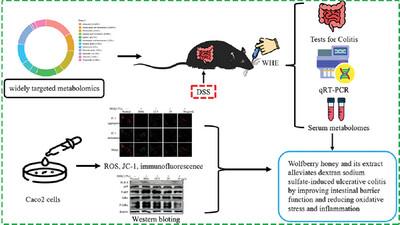Wolfberry Honey and Its Extract Alleviate Dextran Sodium Sulfate-Induced Ulcerative Colitis by Improving Intestinal Barrier Function and Reducing Oxidative Stress and Inflammation
IF 4.5
2区 农林科学
Q1 FOOD SCIENCE & TECHNOLOGY
引用次数: 0
Abstract
Inflammatory bowel disease (IBD) is a chronic condition characterized by gut inflammation causing persistent diarrhea and abdominal pain. Despite the nutritional benefits of wolfberry honey (from Lycium barbarum L.), its potential to alleviate IBD remains underexplored. This study evaluated the protective effects of wolfberry honey and its extract (wolfberry honey extract [WHE]) against dextran sulfate sodium (DSS)-induced ulcerative colitis (UC) using in vivo and in vitro models. Mice pretreated with wolfberry honey showed significant symptom improvement in DSS-induced UC, linked to reduced expression of proinflammatory markers (Il-1β, Il-6, Tnf-α, and Mcp-1) and increased antioxidant genes (Nrf2, Sod2). Increased Occludin levels indicated improved intestinal barrier function. In vitro, WHE protected DSS-treated Caco-2 cells by lowering reactive oxygen species (ROS), stabilizing mitochondrial membrane potential, and inhibiting TLR4/NF-κB signaling. It enhanced the expression of antioxidant genes and tight junction proteins (ZO-1, Occludin, and Claudin-1). Metabolomic analysis revealed that WHE modulated glycerophospholipid metabolism, increasing phosphatidylcholine and choline levels and decreasing lysophosphatidylcholine levels. These results highlight the potential of wolfberry honey and its extract as nutraceuticals for managing UC through their effects on inflammation, oxidative stress, and intestinal barrier function. Further research is warranted to elucidate their mechanisms of action and assess their long-term therapeutic benefits in IBD management.

炎症性肠病(IBD)是一种慢性疾病,其特点是肠道炎症导致持续腹泻和腹痛。尽管枸杞蜂蜜(取自枸杞)具有营养价值,但其缓解 IBD 的潜力仍未得到充分开发。本研究采用体内和体外模型评估了枸杞蜂蜜及其提取物(枸杞蜂蜜提取物 [WHE])对葡聚糖硫酸钠(DSS)诱导的溃疡性结肠炎(UC)的保护作用。用枸杞蜂蜜预处理的小鼠在右旋糖酐硫酸钠诱导的溃疡性结肠炎中表现出明显的症状改善,这与促炎标志物(Il-1β、Il-6、Tnf-α和Mcp-1)的表达减少以及抗氧化基因(Nrf2和Sod2)的增加有关。Occludin水平的提高表明肠道屏障功能得到改善。在体外,WHE 通过降低活性氧(ROS)、稳定线粒体膜电位和抑制 TLR4/NF-κB 信号传导来保护经 DSS 处理的 Caco-2 细胞。它还能提高抗氧化基因和紧密连接蛋白(ZO-1、Occludin 和 Claudin-1)的表达。代谢组分析表明,枸杞多糖能调节甘油磷脂代谢,提高磷脂酰胆碱和胆碱水平,降低溶血磷脂酰胆碱水平。这些结果凸显了枸杞蜂蜜及其提取物通过对炎症、氧化应激和肠道屏障功能的影响,作为营养保健品来控制 UC 的潜力。为了阐明它们的作用机制并评估其在 IBD 治疗中的长期疗效,还需要开展进一步的研究。
本文章由计算机程序翻译,如有差异,请以英文原文为准。
求助全文
约1分钟内获得全文
求助全文
来源期刊

Molecular Nutrition & Food Research
工程技术-食品科技
CiteScore
8.70
自引率
1.90%
发文量
250
审稿时长
1.7 months
期刊介绍:
Molecular Nutrition & Food Research is a primary research journal devoted to health, safety and all aspects of molecular nutrition such as nutritional biochemistry, nutrigenomics and metabolomics aiming to link the information arising from related disciplines:
Bioactivity: Nutritional and medical effects of food constituents including bioavailability and kinetics.
Immunology: Understanding the interactions of food and the immune system.
Microbiology: Food spoilage, food pathogens, chemical and physical approaches of fermented foods and novel microbial processes.
Chemistry: Isolation and analysis of bioactive food ingredients while considering environmental aspects.
 求助内容:
求助内容: 应助结果提醒方式:
应助结果提醒方式:


